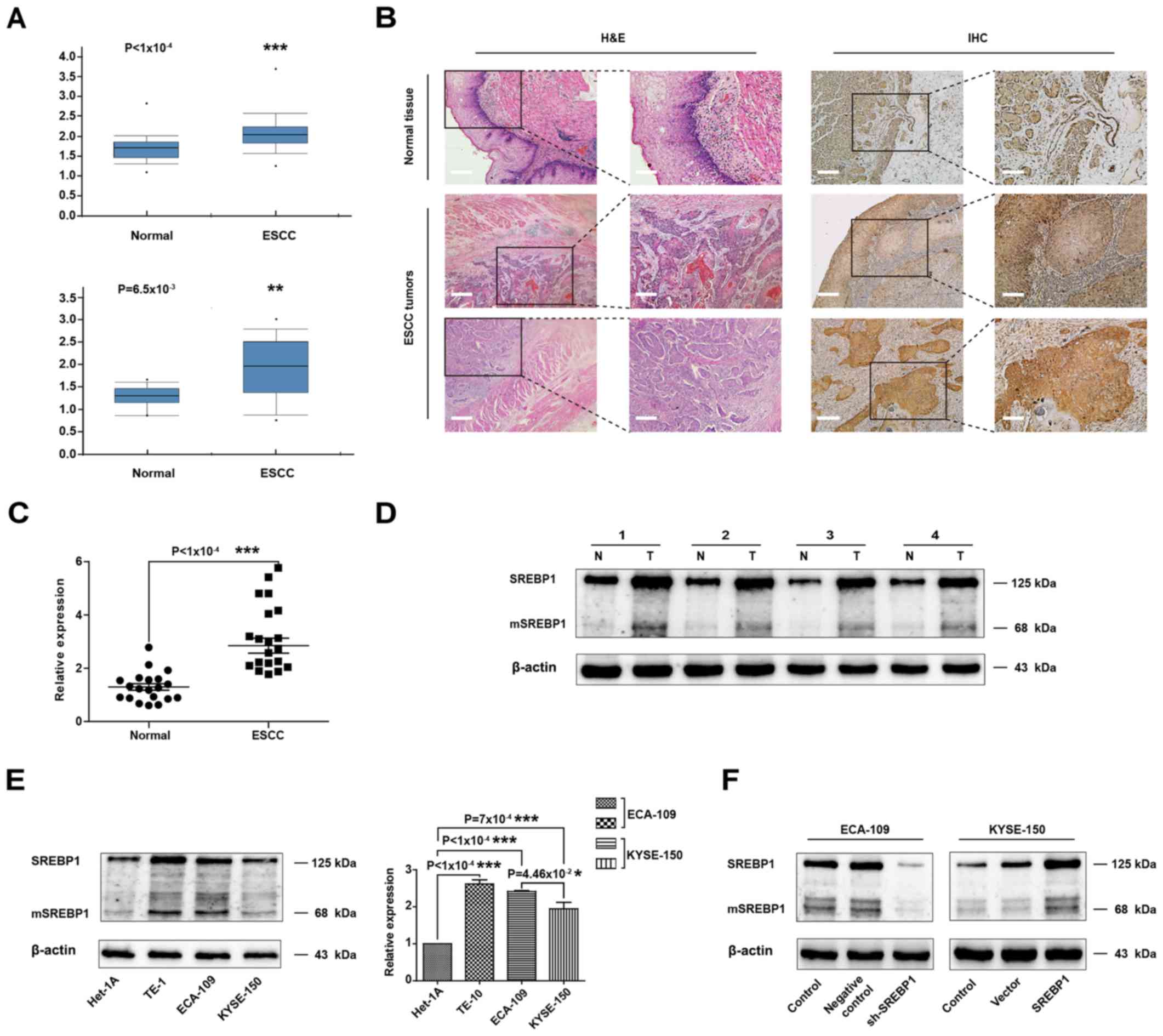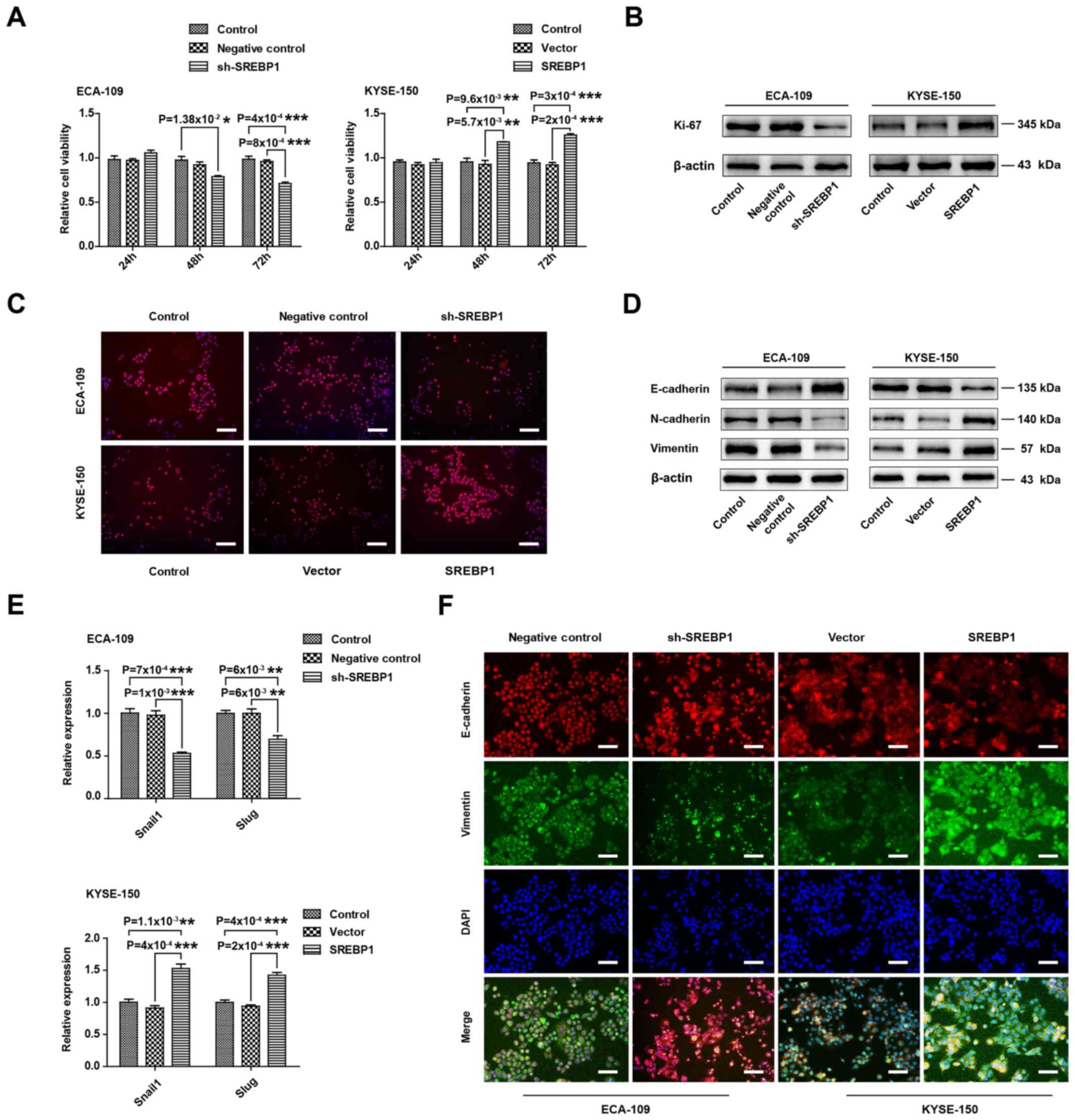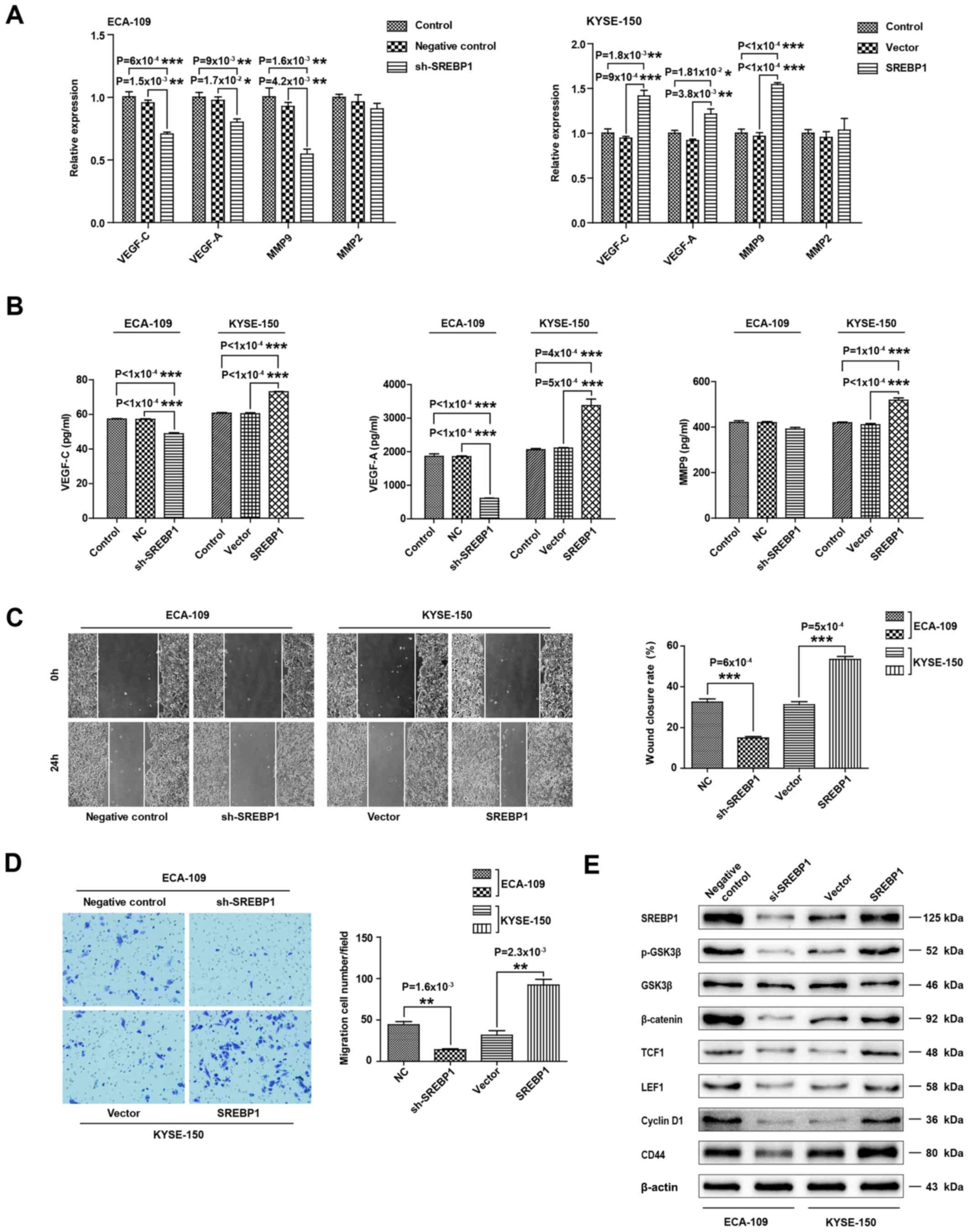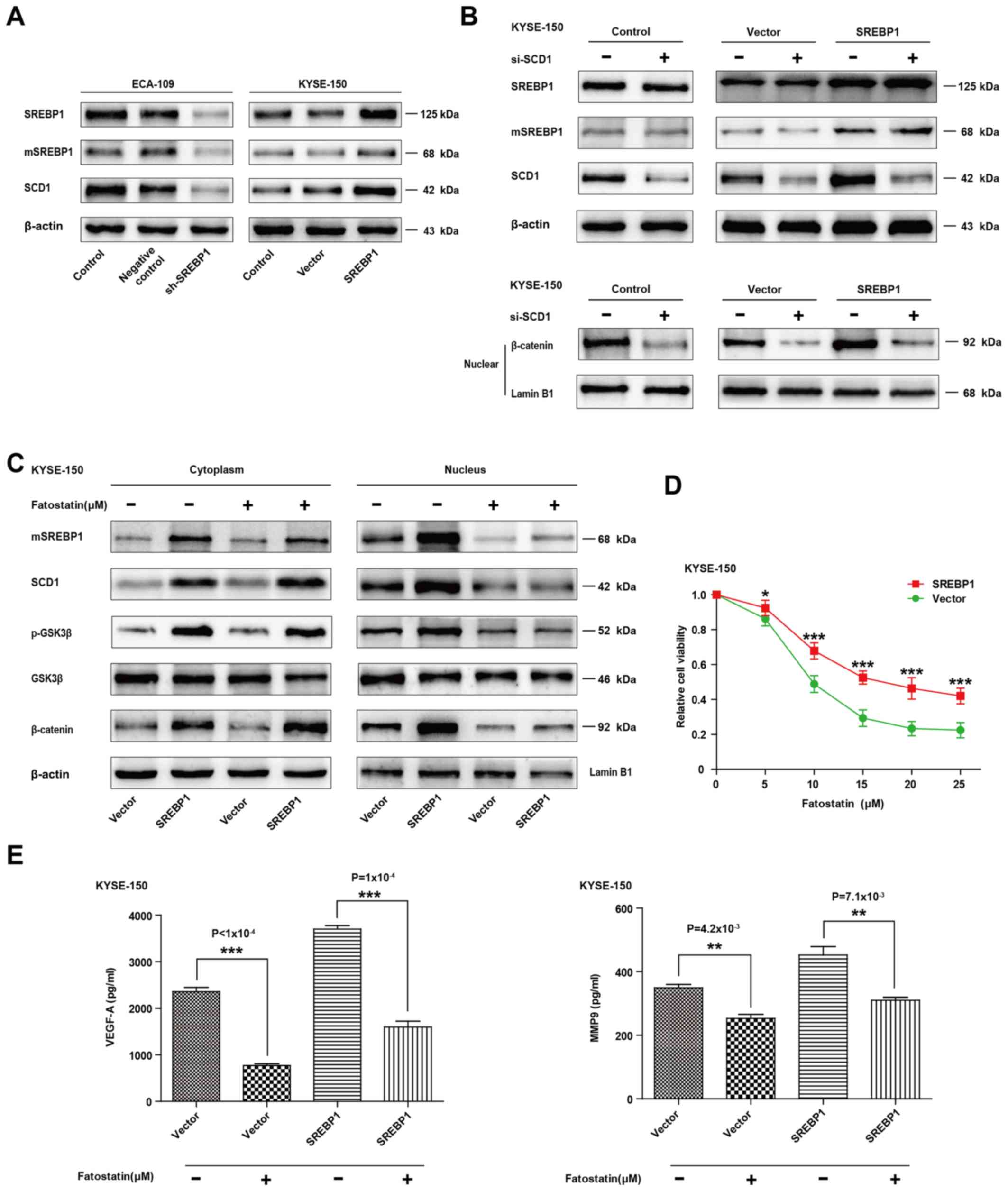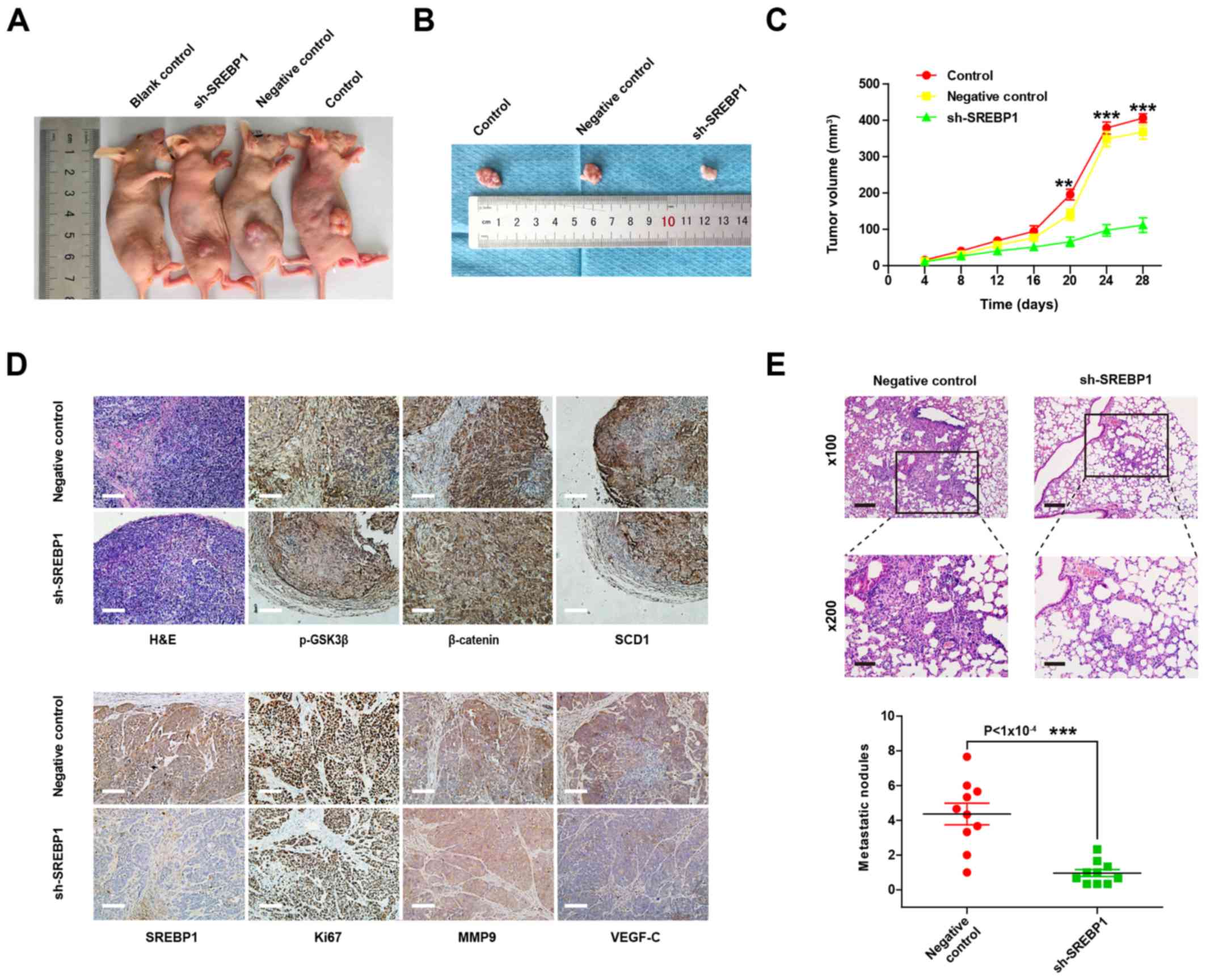|
1
|
Bray F, Ferlay J, Soerjomataram I, Siegel
RL, Torre LA and Jemal A: Global cancer statistics 2018: GLOBOCAN
estimates of incidence and mortality worldwide for 36 cancers in
185 countries. CA Cancer J Clin. 68 (Suppl 8):S394–S424. 2018.
View Article : Google Scholar
|
|
2
|
Abnet CC, Arnold M and Wei WQ:
Epidemiology of esophageal squamous cell carcinoma.
Gastroenterology. 154:360–373. 2018. View Article : Google Scholar : PubMed/NCBI
|
|
3
|
McGuire S: World cancer report 2014.
Geneva, Switzerland: World Health Organization, International
Agency for Research on Cancer, WHO Press, 2015. Adv Nutr.
7:418–419. 2016. View Article : Google Scholar : PubMed/NCBI
|
|
4
|
Wang H, Deng F, Liu Q and Ma Y: Prognostic
significance of lymph node metastasis in esophageal squamous cell
carcinoma. Pathol Res Pract. 213:842–847. 2017. View Article : Google Scholar : PubMed/NCBI
|
|
5
|
Hou H, Meng Z, Zhao X, Ding G, Sun M, Wang
W and Wang Y: Survival of esophageal cancer in China: A pooled
analysis on hospital-based studies from 2000 to 2018. Front Oncol.
9:5482019. View Article : Google Scholar : PubMed/NCBI
|
|
6
|
Ordóñez-Morán P and Huelsken J: Complex
metastatic niches: Already a target for therapy? Curr Opin Cell
Biol. 31:29–38. 2014. View Article : Google Scholar : PubMed/NCBI
|
|
7
|
Chen D, Li W, Liu S, Su Y, Han G, Xu C,
Liu H, Zheng T, Zhou Y and Mao C: Interleukin-23 promotes the
epithelial-mesenchymal transition of oesophageal carcinoma cells
via the Wnt/β-catenin pathway. Sci Rep. 5:86042015. View Article : Google Scholar : PubMed/NCBI
|
|
8
|
Wang H, Yang X, Guo Y, Shui L, Li S, Bai
Y, Liu Y, Zeng M and Xia J: HERG1 promotes esophageal squamous cell
carcinoma growth and metastasis through TXNDC5 by activating the
PI3K/AKT pathway. J Exp Clin Cancer Res. 38:3242019. View Article : Google Scholar : PubMed/NCBI
|
|
9
|
Zhou H, Liu Y, Zhu R, Ding F, Cao X, Lin D
and Liu Z: OTUB1 promotes esophageal squamous cell carcinoma
metastasis through modulating Snail stability. Oncogene.
37:3356–3368. 2018. View Article : Google Scholar : PubMed/NCBI
|
|
10
|
Li L, Zhou H, Zhu R and Liu Z: USP26
promotes esophageal squamous cell carcinoma metastasis through
stabilizing Snail. Cancer Lett. 448:52–60. 2019. View Article : Google Scholar : PubMed/NCBI
|
|
11
|
Ling R, Zhou Y, Zhou L, Dai D, Wu D, Mi L,
Mao C and Chen D: Lin28/microRNA-let-7a promotes metastasis under
circumstances of hyperactive Wnt signaling in esophageal squamous
cell carcinoma. Mol Med Rep. 17:5265–5271. 2018.PubMed/NCBI
|
|
12
|
Pang L, Li Q, Li S, He J, Cao W, Lan J,
Sun B, Zou H, Wang C, Liu R, et al: Membrane type 1-matrix
metalloproteinase induces epithelial-to-mesenchymal transition in
esophageal squamous cell carcinoma: Observations from clinical and
in vitro analyses. Sci Rep. 6:221792016. View Article : Google Scholar : PubMed/NCBI
|
|
13
|
Dias IH, Borah K, Amin B, Griffiths HR,
Sassi K, Lizard G, Iriondo A and Martinez-Lage P: Localisation of
oxysterols at the sub-cellular level and in biological fluids. J
Steroid Biochem Mol Biol. 193:1054262019. View Article : Google Scholar : PubMed/NCBI
|
|
14
|
Matsudaira T, Mukai K, Noguchi T, Hasegawa
J, Hatta T, Iemura SI, Natsume T, Miyamura N, Nishina H, Nakayama
J, et al: Endosomal phosphatidylserine is critical for the YAP
signalling pathway in proliferating cells. Nat Commun. 8:12462017.
View Article : Google Scholar : PubMed/NCBI
|
|
15
|
Ma XL, Sun YF, Wang BL, Shen MN, Zhou Y,
Chen JW, Hu B, Gong ZJ, Zhang X, Cao Y, et al: Sphere-forming
culture enriches liver cancer stem cells and reveals Stearoyl-CoA
desaturase 1 as a potential therapeutic target. BMC Cancer.
19:7602019. View Article : Google Scholar : PubMed/NCBI
|
|
16
|
Dai S, Yan Y, Xu Z, Zeng S, Qian L, Huo L,
Li X, Sun L and Gong Z: SCD1 confers temozolomide resistance to
human glioma cells via the Akt/GSK3β/β-catenin signaling axis.
Front Pharmacol. 8:9602018. View Article : Google Scholar : PubMed/NCBI
|
|
17
|
Pisanu ME, Noto A, De Vitis C, Morrone S,
Scognamiglio G, Botti G, Venuta F, Diso D, Jakopin Z, Padula F, et
al: Blockade of Stearoyl-CoA-desaturase 1 activity reverts
resistance to cisplatin in lung cancer stem cells. Cancer Lett.
406:93–104. 2017. View Article : Google Scholar : PubMed/NCBI
|
|
18
|
Noto A, De Vitis C, Pisanu ME, Roscilli G,
Ricci G, Catizone A, Sorrentino G, Chianese G, Taglialatela-Scafati
O, Trisciuoglio D, et al: Stearoyl-CoA-desaturase 1 regulates lung
cancer stemness via stabilization and nuclear localization of
YAP/TAZ. Oncogene. 36:4573–4584. 2017. View Article : Google Scholar : PubMed/NCBI
|
|
19
|
Tao T, Su Q, Xu S, Deng J, Zhou S, Zhuang
Y, Huang Y, He C, He S, Peng M, et al: Down-regulation of PKM2
decreases FASN expression in bladder cancer cells through
AKT/mTOR/SREBP-1c axis. J Cell Physiol. 234:3088–3104. 2019.
View Article : Google Scholar : PubMed/NCBI
|
|
20
|
Zhu J, Jin J, Ding J, Li S, Cen P, Wang K,
Wang H and Xia J: Ganoderic Acid A improves high fat diet-induced
obesity, lipid accumulation and insulin sensitivity through
regulating SREBP pathway. Chem-Biol Interact. 290:77–87. 2018.
View Article : Google Scholar : PubMed/NCBI
|
|
21
|
Olmstead AD, Knecht W, Lazarov I, Dixit SB
and Jean F: Human subtilase SKI-1/S1P is a master regulator of the
HCV Lifecycle and a potential host cell target for developing
indirect-acting antiviral agents. PLoS Pathog. 8:e10024682012.
View Article : Google Scholar : PubMed/NCBI
|
|
22
|
Mustafa M, Wang TN, Chen X, Gao B and
Krepinsky JC: SREBP inhibition ameliorates renal injury after
unilateral ureteral obstruction. Am J Physiol Renal Physiol.
311:F614–F625. 2016. View Article : Google Scholar : PubMed/NCBI
|
|
23
|
Zhou C, Qian W, Ma J, Cheng L, Jiang Z,
Yan B, Li J, Duan W, Sun L, Cao J, et al: Resveratrol enhances the
chemotherapeutic response and reverses the stemness induced by
gemcitabine in pancreatic cancer cells via targeting SREBP1. Cell
Prolif. 52:e125142019. View Article : Google Scholar : PubMed/NCBI
|
|
24
|
Nie LY, Lu QT, Li WH, Yang N, Dongol S,
Zhang X and Jiang J: Sterol regulatory element-binding protein 1 is
required for ovarian tumor growth. Oncol Rep. 30:1346–1354. 2013.
View Article : Google Scholar : PubMed/NCBI
|
|
25
|
Cheng C, Ru P, Geng F, Liu J, Yoo JY, Wu
X, Cheng X, Euthine V, Hu P, Guo JY, et al: Glucose-Mediated
N-glycosylation of SCAP is essential for SREBP-1 activation and
tumor growth. Cancer Cell. 28:569–581. 2015. View Article : Google Scholar : PubMed/NCBI
|
|
26
|
Griffiths B, Lewis CA, Bensaad K, Ros S,
Zhang Q, Ferber EC, Konisti S, Peck B, Miess H, East P, et al:
Sterol regulatory element binding protein-dependent regulation of
lipid synthesis supports cell survival and tumor growth. Cancer
Metab. 1:32013. View Article : Google Scholar : PubMed/NCBI
|
|
27
|
Singh KB, Hahm ER, Pore SK and Singh SV:
Leelamine is a novel lipogenesis inhibitor in prostate cancer cells
in vitro and in vivo. Mol Cancer Ther. 18:1800–1810. 2019.
View Article : Google Scholar : PubMed/NCBI
|
|
28
|
Gao Y, Nan X, Shi X, Mu X, Liu B, Zhu H,
Yao B, Liu X, Yang T, Hu Y and Liu S: SREBP1 promotes the invasion
of colorectal cancer accompanied upregulation of MMP7 expression
and NF-kappaB pathway activation. BMC Cancer. 19:6852019.
View Article : Google Scholar : PubMed/NCBI
|
|
29
|
Yoshida GJ, Saya H and Zouboulis CC:
Three-dimensional culture of sebaceous gland cells revealing the
role of prostaglandin E2-induced activation of canonical Wnt
signaling. Biochem Biophys Res Commun. 438:640–646. 2013.
View Article : Google Scholar : PubMed/NCBI
|
|
30
|
Wang Y, Guo D, He J, Song L, Chen H, Zhang
Z and Tan N: Inhibition of fatty acid synthesis arrests colorectal
neoplasm growth and metastasis: Anti-cancer therapeutical effects
of natural cyclopeptide RA-XII. Biochem Biophys Res Commun.
512:819–824. 2019. View Article : Google Scholar : PubMed/NCBI
|
|
31
|
Sorrentino G, Ruggeri N, Specchia V,
Cordenonsi M, Mano M, Dupont S, Manfrin A, Ingallina E, Sommaggio
R, Piazza S, et al: Metabolic control of YAP and TAZ by the
mevalonate pathway. Nat Cell Biol. 16:357–366. 2014. View Article : Google Scholar : PubMed/NCBI
|
|
32
|
Bertolio R, Napoletano F, Mano M,
Maurer-Stroh S, Fantuz M, Zannini A, Bicciato S, Sorrentino G and
Del Sal G: Sterol regulatory element binding protein 1 couples
mechanical cues and lipid metabolism. Nat Commun. 10:13262019.
View Article : Google Scholar : PubMed/NCBI
|
|
33
|
Sodi VL, Bacigalupa ZA, Ferrer CM, Lee JV,
Gocal WA, Mukhopadhyay D, Wellen KE, Ivan M and Reginato MJ:
Nutrient sensor O-GlcNAc transferase controls cancer lipid
metabolism via SREBP-1 regulation. Oncogene. 37:924–934. 2018.
View Article : Google Scholar : PubMed/NCBI
|
|
34
|
Du T, Sikora MJ, Levine KM, Tasdemir N,
Riggins RB, Wendell SG, Van Houten B and Oesterreich S: Key
regulators of lipid metabolism drive endocrine resistance in
invasive lobular breast cancer. Breast Cancer Res. 20:1062018.
View Article : Google Scholar : PubMed/NCBI
|
|
35
|
Zhou C, Qian W, Li J, Ma J, Chen X, Jiang
Z, Cheng L, Duan W, Wang Z, Wu Z, et al: High glucose
microenvironment accelerates tumor growth via SREBP1-autophagy axis
in pancreatic cancer. J Exp Clin Cancer Res. 38:3022019. View Article : Google Scholar : PubMed/NCBI
|
|
36
|
Gouw AM, Margulis K, Liu NS, Raman SJ,
Mancuso A, Toal GG, Tong L, Mosley A, Hsieh AL, Sullivan DK, et al:
The MYC oncogene cooperates with sterol-regulated element-binding
protein to regulate lipogenesis essential for neoplastic growth.
Cell Metab. 30:556–572.e5. 2019. View Article : Google Scholar : PubMed/NCBI
|
|
37
|
Hu N, Clifford RJ, Yang HH, Wang C,
Goldstein AM, Ding T, Taylor PR and Lee MP: Genome wide analysis of
DNA copy number neutral loss of heterozygosity (CNNLOH) and its
relation to gene expression in esophageal squamous cell carcinoma.
BMC Genomics. 11:5762010. View Article : Google Scholar : PubMed/NCBI
|
|
38
|
Su H, Hu N, Yang HH, Wang C, Takikita M,
Wang QH, Giffen C, Clifford R, Hewitt SM, Shou JZ, et al: Global
gene expression profiling and validation in esophageal squamous
cell carcinoma and its association with clinical phenotypes. Clin
Cancer Res. 17:2955–2966. 2011. View Article : Google Scholar : PubMed/NCBI
|
|
39
|
Hu G, Zhou Y, Zhu Y, Zhou L, Ling R, Wu D,
Mi L, Wang X, Dai D, Mao C and Chen D: Novel transduction of
nutrient stress to Notch pathway by RasGRP3 promotes malignant
aggressiveness in human esophageal squamous cell carcinoma. Oncol
Rep. 38:2975–2984. 2017. View Article : Google Scholar : PubMed/NCBI
|
|
40
|
Zhou Y, Su Y, Zhu H, Wang X, Li X, Dai C,
Xu C, Zheng T, Mao C and Chen D: Interleukin-23 receptor signaling
mediates cancer dormancy and radioresistance in human esophageal
squamous carcinoma cells via the Wnt/Notch pathway. J Mol Med
(Berl). 97:177–188. 2019. View Article : Google Scholar : PubMed/NCBI
|
|
41
|
Brown M, Hart C, Tawadros T, Ramani V,
Sangar V, Lau M and Clarke N: The differential effects of statins
on the metastatic behaviour of prostate cancer. Br J Cancer.
106:1689–1696. 2012. View Article : Google Scholar : PubMed/NCBI
|
|
42
|
Huang CM, Huang CS, Hsu TN, Huang MS, Fong
IH, Lee WH and Liu SC: Disruption of cancer metabolic
SREBP1/miR-142-5p suppresses epithelial-mesenchymal transition and
stemness in esophageal carcinoma. Cells. 9:72019. View Article : Google Scholar
|
|
43
|
Zhou C, Zhang L and Xu P: Growth
inhibition and chemo-radiosensitization of esophageal squamous cell
carcinoma by survivin-shRNA lentivirus transfection. Oncol Lett.
16:4813–4820. 2018.PubMed/NCBI
|
|
44
|
Livak KJ and Schmittgen TD: Analysis of
relative gene expression data using real-time quantitative PCR and
the 2(-Delta Delta C(T)) method. Methods. 25:402–408. 2001.
View Article : Google Scholar : PubMed/NCBI
|
|
45
|
Shao W, Machamer CE and Espenshade PJ:
Fatostatin blocks ER exit of SCAP but inhibits cell growth in a
SCAP-independent manner. J Lipid Res. 57:1564–1573. 2016.
View Article : Google Scholar : PubMed/NCBI
|
|
46
|
Pierrot N, Tyteca D, D'Auria L, Dewachter
I, Gailly P, Hendrickx A, Tasiaux B, Haylani LE, Muls N, N'kuli F,
et al: Amyloid precursor protein controls cholesterol turnover
needed for neuronal activity. EMBO Mol Med. 5:608–625. 2013.
View Article : Google Scholar : PubMed/NCBI
|
|
47
|
Guillet-Deniau I, Pichard AL, Koné A,
Esnous C, Nieruchalski M, Girard J and Prip-Buus C: Glucose induces
de novo lipogenesis in rat muscle satellite cells through a
sterol-regulatory-element-binding-protein-1c-dependent pathway. J
Cell Sci. 117:1937–1944. 2004. View Article : Google Scholar : PubMed/NCBI
|
|
48
|
Koizume S, Takahashi T, Yoshihara M,
Nakamura Y, Ruf W, Takenaka K, Miyagi E and Miyagi Y: Cholesterol
starvation and hypoxia activate the FVII gene via the SREBP1-GILZ
pathway in ovarian cancer cells to produce procoagulant
microvesicles. Thromb Haemost. 119:1058–1071. 2019. View Article : Google Scholar : PubMed/NCBI
|
|
49
|
Lo AK, Lung RW, Dawson CW, Young LS, Ko
CW, Yeung WW, Kang W, To KF and Lo KW: Activation of sterol
regulatory element-binding protein 1 (SREBP1)-mediated lipogenesis
by the Epstein-Barr virus-encoded latent membrane protein 1 (LMP1)
promotes cell proliferation and progression of nasopharyngeal
carcinoma. J Pathol. 246:180–190. 2018. View Article : Google Scholar : PubMed/NCBI
|
|
50
|
Perone Y, Farrugia AJ, Meira AR,
Rodríguez-Meira A, Győrffy B, Ion C, Uggetti A, Chronopoulos A,
Marrazzo P, Faronato M, et al: SREBP1 drives Keratin-80-dependent
cytoskeletal changes and invasive behavior in endocrine-resistant
ERα breast cancer. Nat Commun. 10:21152019. View Article : Google Scholar : PubMed/NCBI
|
|
51
|
Zhang N, Zhang H, Liu Y, Su P, Zhang J,
Wang X, Sun M, Chen B, Zhao W, Wang L, et al: SREBP1, targeted by
miR-18a-5p, modulates epithelial-mesenchymal transition in breast
cancer via forming a co-repressor complex with Snail and HDAC1/2.
Cell Death Differ. 26:843–859. 2019. View Article : Google Scholar : PubMed/NCBI
|
|
52
|
Yang J, Antin P, Berx G, Blanpain C,
Brabletz T, Bronner M, Campbell K, Cano A, Casanova J, Christofori
G, et al: Guidelines and definitions for research on
epithelial-mesenchymal transition. Nat Rev Mol Cell Biol.
21:341–352. 2020. View Article : Google Scholar : PubMed/NCBI
|
|
53
|
Gong F, Chen MF, Chen J, Li C, Zhou C,
Hong P, Sun S and Qian ZJ: Boiled abalone byproduct peptide
exhibits anti-tumor activity in HT1080 cells and HUVECs by
suppressing the metastasis and angiogenesis in vitro. J Agric Food
Chem. 67:8855–8867. 2019. View Article : Google Scholar : PubMed/NCBI
|
|
54
|
Motoyama K, Fukumoto S, Koyama H, Emoto M,
Shimano H, Maemura K and Nishizawa Y: SREBP inhibits VEGF
expression in human smooth muscle cells. Biochem Biophys Res
Commun. 342:354–360. 2006. View Article : Google Scholar : PubMed/NCBI
|
|
55
|
Zhang L, Wang JH, Liang RX, Huang ST, Xu
J, Yuan LJ, Huang L, Zhou Y, Yu XJ, Wu SY, et al: RASSF8
downregulation promotes lymphangiogenesis and metastasis in
esophageal squamous cell carcinoma. Oncotarget. 6:34510–34524.
2015. View Article : Google Scholar : PubMed/NCBI
|
|
56
|
Liu G, Kuang S, Cao R, Wang J, Peng Q and
Sun C: Sorafenib kills liver cancer cells by disrupting
SCD1-mediated synthesis of monounsaturated fatty acids via the
ATP-AMPK-mTOR-SREBP1 signaling pathway. FASEB J. 33:10089–10103.
2019. View Article : Google Scholar : PubMed/NCBI
|
|
57
|
Jain P, Nattakom M, Holowka D, Wang DH,
Thomas Brenna J, Ku AT, Nguyen H, Ibrahim SF and Tumbar T: Runx1
role in epithelial and cancer cell proliferation implicates lipid
metabolism and scd1 and soat1 Activity. Stem cells. 36:1603–1616.
2018. View Article : Google Scholar : PubMed/NCBI
|
|
58
|
Mancini R, Noto A, Pisanu ME, De Vitis C,
Maugeri-Sacca M and Ciliberto G: Metabolic features of cancer stem
cells: The emerging role of lipid metabolism. Oncogene.
37:2367–2378. 2018. View Article : Google Scholar : PubMed/NCBI
|
|
59
|
El Helou R, Pinna G, Cabaud O, Wicinski J,
Bhajun R, Guyon L, Rioualen C, Finetti P, Gros A, Mari B, et al:
miR-600 acts as a bimodal switch that regulates breast cancer stem
cell fate through WNT signaling. Cell Rep. 18:2256–2268. 2017.
View Article : Google Scholar : PubMed/NCBI
|
|
60
|
Bruschini S, di Martino S, Pisanu ME,
Fattore L, De Vitis C, Laquintana V, Buglioni S, Tabbì E, Cerri A,
Visca P, et al: CytoMatrix for a reliable and simple
characterization of lung cancer stem cells from malignant pleural
effusions. J Cell Physiol. 235:1877–1887. 2020. View Article : Google Scholar : PubMed/NCBI
|
|
61
|
Lim CH, Park YJ, Shin M, Cho YS, Choi JY,
Lee KH and Hyun SH: Tumor SUVs on 18F-FDG PET/CT and aggressive
pathological features in esophageal squamous cell carcinoma. Clin
Nucl Med. 45:e128–e133. 2020. View Article : Google Scholar : PubMed/NCBI
|















